 Estate planning in New York is important since it provides a procedure for a person to document the manner in which assets are to be disposed of at death. There are many different aspects to planning an estate, which also may include lifetime directives in the form of advance directives. The various documents which may be involved include a Last Will and Testament, Living Will, Revocable Trust, Power of Attorney and Health Care Proxy.
Estate planning in New York is important since it provides a procedure for a person to document the manner in which assets are to be disposed of at death. There are many different aspects to planning an estate, which also may include lifetime directives in the form of advance directives. The various documents which may be involved include a Last Will and Testament, Living Will, Revocable Trust, Power of Attorney and Health Care Proxy.
First and foremost, a Will is a document which disposes of assets which are held by a person in his own name. It may contain bequests of specific amounts of funds or may provide for dispositions in shares or percentages. The New York Probate Lawyer Blog has published many articles concerning the creation of Wills and also the probate process.
When a Will is filed with the Surrogate’s Court for probate, there is a requirement that all of a decedent’s next of kin be notified. This is due to the fact that next of kin or distributees have a right to contest a Will. Will Contests are not uncommon. Family members who are either disinherited or did not receive what they believe to be an appropriate share of an estate often seek to invalidate a propounded Will.
 New York Probate Lawyer Blog
New York Probate Lawyer Blog









